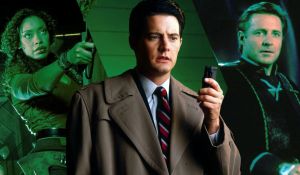Sticking the landing is one of the hardest tricks in television, regardless of genre. However, for science fiction shows, which often build intricate mythologies and pose huge philosophical questions over many seasons, crafting a satisfying series finale is a monumental task. A great ending must provide emotional closure for the characters viewers have grown to love, offer a sense of resolution to the central narrative, and feel like a thematically appropriate conclusion to the entire journey. When it works, a finale can retroactively elevate the whole series, cementing its place in television history as a masterpiece of storytelling from beginning to end.
Videos by ComicBook.com
Sadly, when a finale fails, it can be a spectacular disaster. A bad ending can tarnish the legacy of an otherwise beloved show, leaving fans feeling frustrated, betrayed, or simply confused. What’s worse, some endings are so bad because they are conclusions that seem to disregard years of character development, leave major plot threads dangling, or provide answers that feel cheap and unearned. Here are five sci-fi TV shows that nailed their finale, and five that definitely didn’t.
10) Star Trek: The Next Generation (Great Ending)
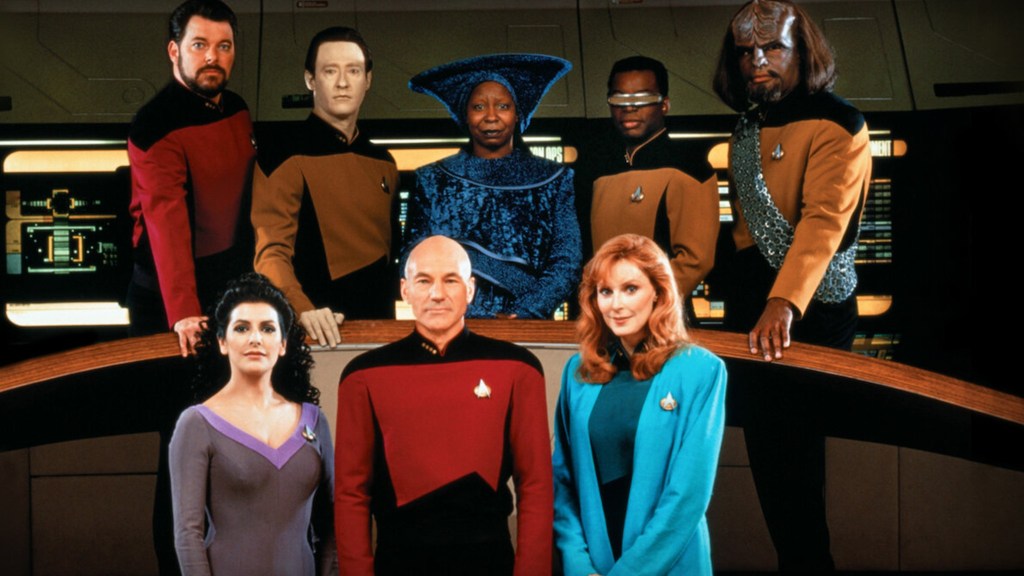
The finale of Star Trek: The Next Generation, “All Good Things…,” is widely considered one of the best in television history. The episode sees Captain Picard (Patrick Stewart) uncontrollably shifting between the past, present, and future, forced by the omnipotent being Q (John de Lancie) to solve a cosmic mystery that threatens humanity’s existence. The plot is a brilliant sci-fi puzzle that brings the series full circle, connecting directly back to the show’s very first episode, “Encounter at Farpoint.” This structure allows the finale to serve as a celebration of the entire series.
What makes “All Good Things…” so perfect is its focus on character and theme. While the stakes are immense, the true heart of the story lies in Picard’s journey and his relationship with his crew. The episode explores ideas of growth, potential, and the importance of embracing new possibilities. The final scene, in which Picard finally joins his senior staff for their regular poker game, is a quiet, poignant, and emotionally resonant moment that beautifully encapsulates the found-family dynamic that defined the show.
9) The X-Files (Awful Ending)
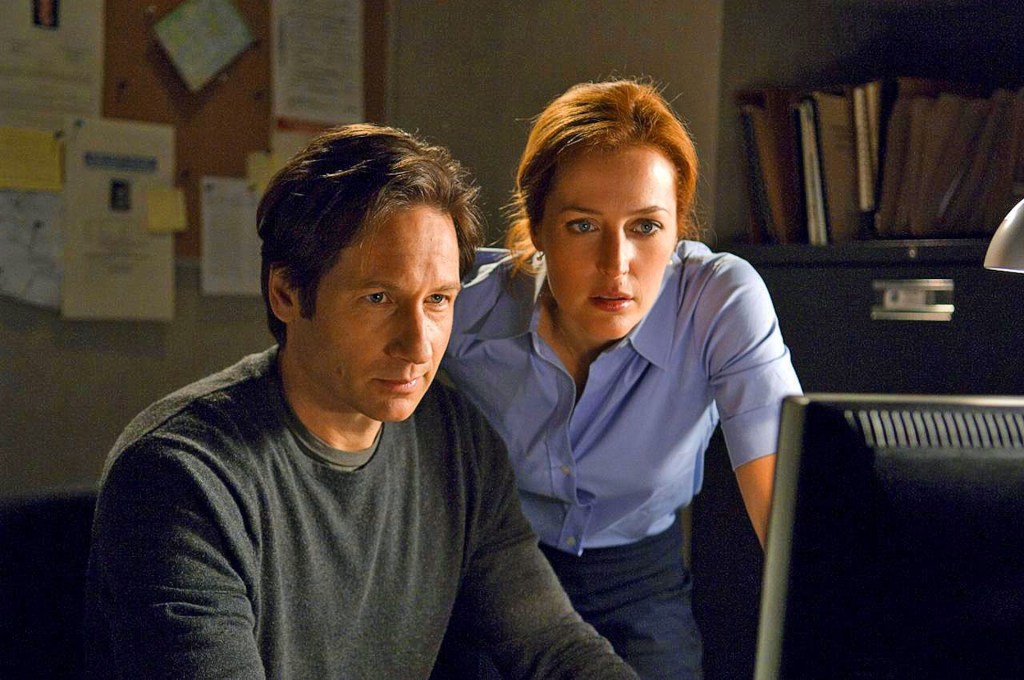
The original run of The X-Files concluded in 2002 with a two-part finale titled “The Truth,” which was met with near-universal disappointment from fans and critics. After nine seasons of chasing shadows, the episode promised to finally reveal the answers behind the sprawling alien conspiracy. The story sees Fox Mulder (David Duchovny) put on a secret military trial for breaking into a government facility, where a parade of past characters testifies to the conspiracy’s existence.
The original X-Files finale failed on almost every level. Instead of providing concrete answers, it rehashed old information and ended with Mulder and Scully on the run, no closer to exposing the truth than they were years earlier. In addition, the supposed 2012 alien invasion date felt like an arbitrary and anticlimactic resolution to the central mythology. It was a frustrating, listless, and unsatisfying conclusion that provided no real closure, a fact underscored by the subsequent revival series, which had to largely sidestep this finale to tell new stories.
8) Babylon 5 (Great Ending)
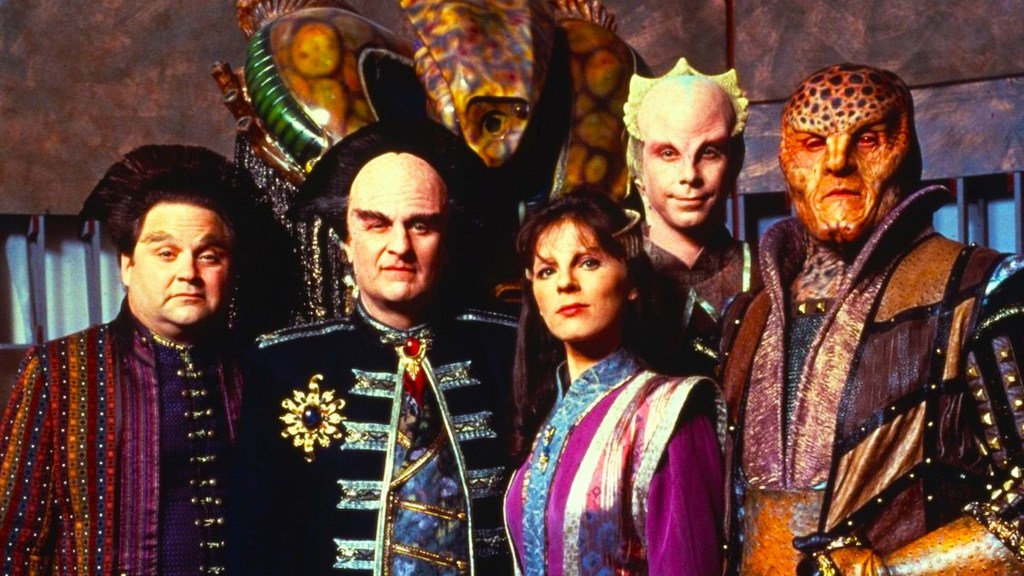
Babylon 5 was a series planned from the outset with a five-year arc, and its finale, “Sleeping in Light,” is a testament to that incredible foresight. The episode, which was actually filmed at the end of the fourth season due to uncertainty about the show’s renewal, serves as a poignant epilogue to the epic space opera. The episode jumps forward twenty years to show the final days of John Sheridan (Bruce Boxleitner) as he gathers his old friends for one last reunion before peacefully meeting his end.
The finale of Babylon 5 is a well-crafted and deeply emotional conclusion that provides a true sense of closure. Unlike many other shows, it does not end with a massive battle or explosive climax, but with a quiet reflection on a life well-lived and the enduring power of friendship. It is a finale that respects its characters and the audience’s investment in them, bringing the sprawling, multi-arc story to a perfect and satisfying close. “Sleeping in Light” is often held up as the gold standard for how to end a long-running serialized narrative because it’s one of the best conclusions in television history, not just for sci-fi TV shows.
7) Star Trek: Enterprise (Awful Ending)
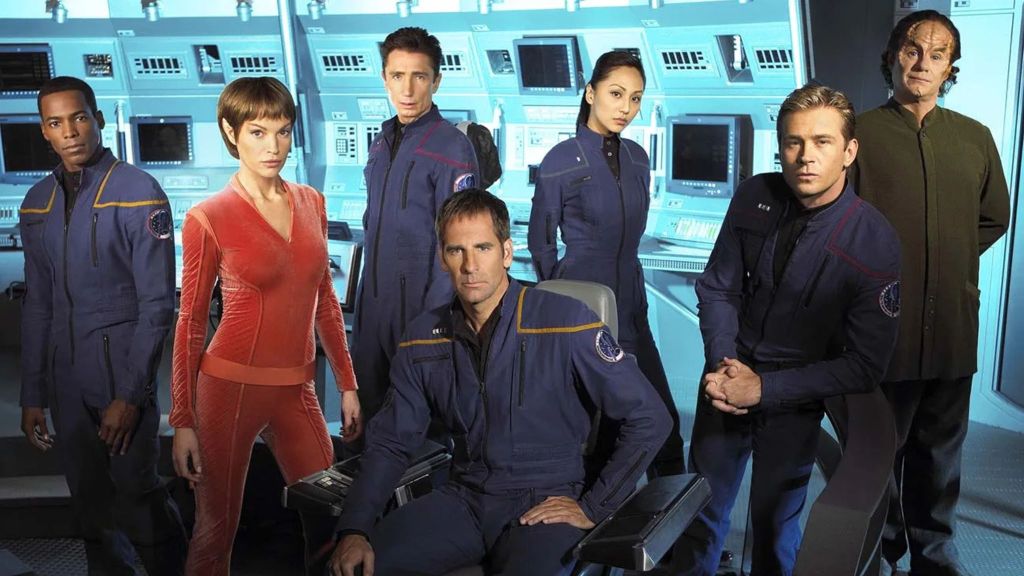
The finale of Star Trek: Enterprise, “These Are the Voyages…,” is almost universally regarded as one of the worst in the entire Star Trek franchise. The episode is framed as a holodeck simulation being viewed by Commander Riker (Jonathan Frakes) and Counselor Troi (Marina Sirtis) during the events of a Star Trek: The Next Generation episode. This narrative device immediately sidelined the Enterprise cast, turning their own finale into a guest spot on a different show.
The problems with Star Trek: Enterprise‘s final episode went far beyond the framing story. The episode featured the shocking and seemingly pointless death of a beloved main character, Trip Tucker (Connor Trinneer), which felt forced and emotionally unearned. The cast of Enterprise themselves expressed their displeasure with the finale, feeling that it was a disservice to their characters and the fans who had followed the show for four seasons. As such, the episode failed to provide any meaningful closure for the crew of the first Enterprise, instead serving as a misguided tribute to a different series.
6) Person of Interest (Great Ending)
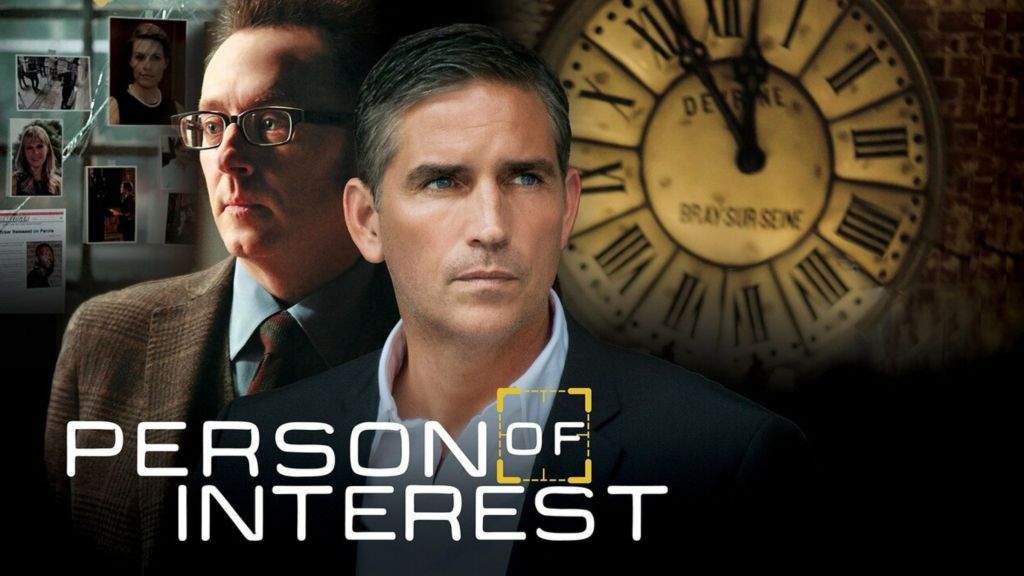
While it began as a procedural, Person of Interest evolved into a sci-fi narrative about a war between two god-like AIs. The finale, “return 0,” brought this conflict to a perfect close. In the finale, Finch (Michael Emerson), believing both his benevolent AI (The Machine) and its rival (Samaritan) are too powerful to exist, initiates a plan to destroy both with a deadly virus. His goal is mutual assured destruction, and he intends to die on a rooftop, ensuring the virus uploads and is distributed.
However, The Machine, having evolved its own sense of purpose, creates a secret counter-plan to preserve a copy of itself on a satellite. It recognizes Finch’s plan but benevolently deceives him, sending him to the wrong rooftop to save his life. John Reese (Jim Caviezel), in a final act of loyalty, understands The Machine’s plan and ensures Finch’s survival by taking his place on the correct rooftop. He dies heroically fighting off Samaritan’s agents while the upload completes, bringing his journey from lost killer to definitive hero to a powerful close. This sacrifice allows Finch his earned peace with his love, Grace, while a final scene with Shaw (Sarah Shahi) answering a payphone confirms that a benevolent part of The Machine endures.
5) Star Trek: Voyager (Awful Ending)
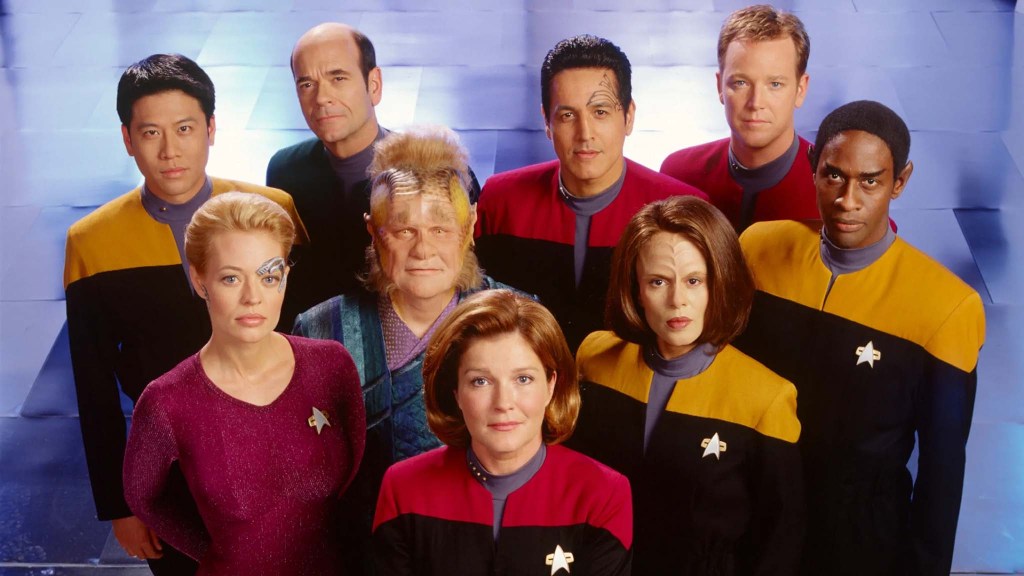
The finale of Star Trek: Voyager, “Endgame,” is widely considered a massive disappointment by the show’s fanbase and critics. After seven years spent lost in the Delta Quadrant, the episode sees a future version of Admiral Janeway (Kate Mulgrew) travel back in time to give her past self advanced Borg technology. This allows the Voyager crew to defeat their greatest enemies and return to Earth in a matter of minutes, completely bypassing the long journey home that was the show’s entire premise.
This time-travel plot provided a rushed ending that negated seven seasons of struggle. Plus, the finale ignored most of the supporting cast’s character arcs in favor of a cheap resolution centered entirely on Janeway and Seven of Nine (Jeri Ryan). Because of that, major relationships were left unresolved, and the emotional payoff of seeing the crew finally reach home was squandered. The episode is a textbook example of a finale that chose a convenient plot device over a meaningful character conclusion, leaving a stain on the show’s legacy.
4) 12 Monkeys (Great Ending)

The Syfy series 12 Monkeys concluded its time-bending narrative with a two-part finale titled “The Beginning,” which is celebrated as a nearly flawless piece of storytelling. After four seasons of intricate paradoxes and emotional turmoil, the finale managed to tie up every loose end and provide a deeply rewarding conclusion for its characters. The episode sees the heroes finally succeed in their mission to stop the Army of the 12 Monkeys and erase the plague-ridden timeline, a victory that comes at a great personal cost.
What makes the finale of 12 Monkeys so remarkable is its ability to deliver both an intellectually satisfying resolution and a powerful emotional payoff. It rewarded viewers who had paid close attention to its complex mythology while never losing sight of the love story at its core. Finally, in a final twist, the show finds a way to give its heroes, James Cole (Aaron Stanford) and Cassie Railly (Amanda Schull), the happy ending they had earned, subverting the expected tragic conclusion.
3) Battlestar Galactica (1978 original series) (Awful Ending)
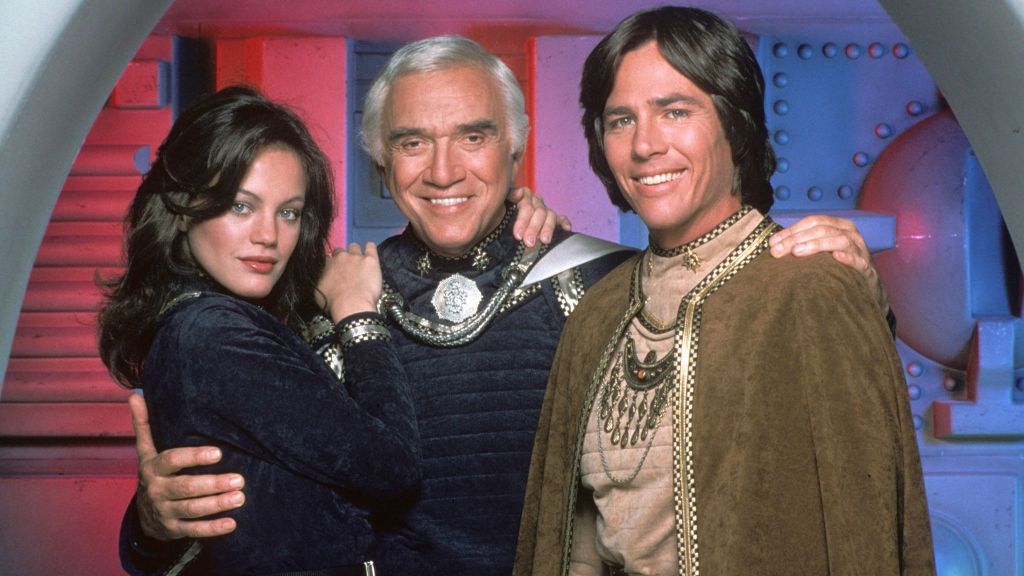
The original Battlestar Galactica was a show with a clear mission: to find the lost colony of humanity known as Earth. However, its final episode, “The Hand of God,” is remembered as a profoundly abrupt ending to that quest. The episode itself is a fairly standard adventure where Starbuck (Dirk Benedict) and Apollo (Richard Hatch) lead a daring attack on a Cylon baseship. The story offers no narrative finality and functions like any other “monster of the week” installment from the season.
What makes this a terrible finale is the tacked-on voiceover at the very end. As the Galactica flies away, narration reveals that the crew received television signals from the 1969 moon landing, confirming they have finally found Earth. That is it. The show ends there, with zero emotional or narrative closure for the characters whose entire journey was about this singular goal. This non-ending, forced by the show’s cancellation, is a classic example of a finale that fails its audience completely.
2) Fringe (Great Ending)
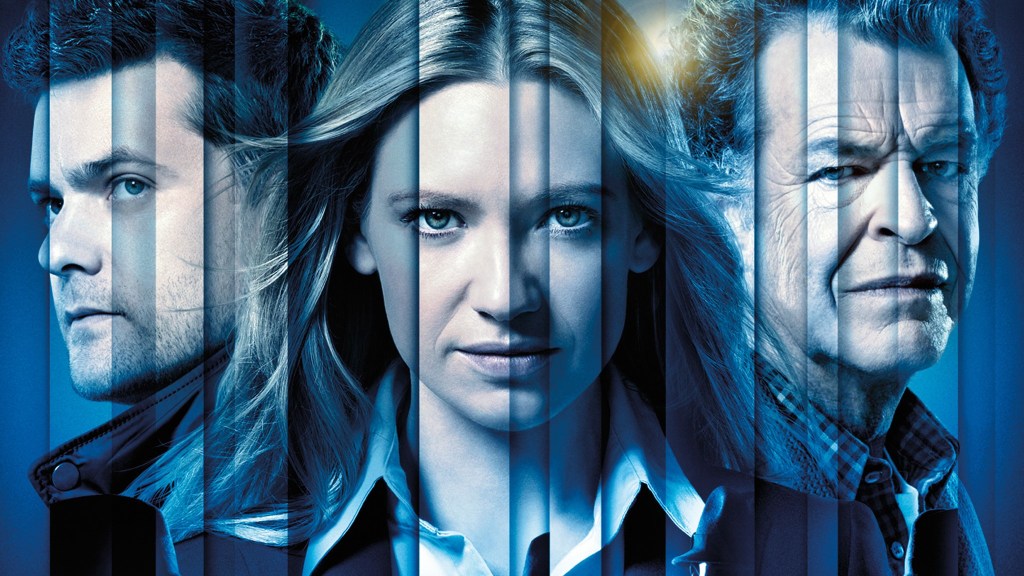
Fringe concluded its five-season run with “An Enemy of Fate,” a finale that delivered an emotionally satisfying resolution. The episode sees the culmination of the team’s plan to defeat the oppressive Observers by resetting the timeline. This requires Walter Bishop (John Noble) to make the ultimate sacrifice, accompanying the Observer child, Michael, into the future to ensure that the Observer invasion never happens. The result is a bittersweet conclusion that honors the show’s core themes of family and sacrifice.
The finale of Fringe was praised for its masterful blend of high-concept sci-fi and heartfelt character moments. It was filled with callbacks and references that served as a love letter to the fans who had followed the series through its five seasons. The final shot, in which Peter (Joshua Jackson) receives a letter from his father containing a drawing of a white tulip, a symbol of redemption, is a perfect moment that trusts the audience to understand its significance. With its ending, Fringe provided a sense of hope and closure while still leaving room for interpretation.
1) Sliders (Awful Ending)
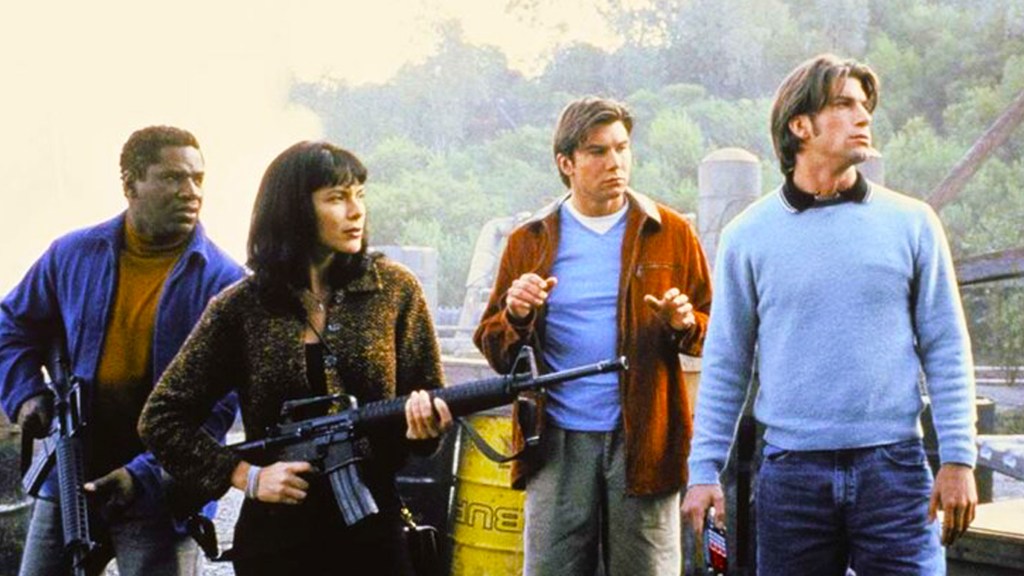
The sci-fi series Sliders was plagued by network interference and a decline in quality, but its finale, “The Seer,” was the culmination of that creative collapse. After seasons of cast changes and convoluted plots, the show had lost its way, making its ending feel less like an unfortunate cancellation and more like an inevitable conclusion. In the episode, Rembrandt “Crying Man” Brown (Cleavant Derricks) heroically jumps into a vortex alone, hoping to save his home world. The episode, and the series, ends right there.
Viewers never find out if Rembrandt survived, if his sacrifice meant anything, or if the original mission to get home was ever completed. This unresolved cliffhanger served as the final insult to long-suffering fans. It was the last gasp of a show that had run out of ideas, causing an exodus of talent that led to the obvious cancellation. Yet, despite knowing that the end was near, the creative team of Sliders didn’t even try to offer fans a resolution, preferring to wrap things with a messy cliffhanger.
Which sci-fi TV show finale do you think is the best or worst? Let us know in the comments.

